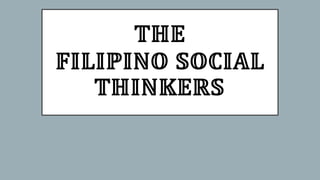thefilipinosocialthinkers.pptx
- 4. ŌĆóBelieved in Agnostic Deism ŌĆō the view that God created the universe with its law, never to interfere with it again. ŌĆóŌĆ£Human problems are irrational human creations and can be solved through rational solutions. If reason commits mistakes, only reason can correct them.ŌĆØ ŌĆóŌĆ£What is the use of independence if the slaves of today will be the tyrants of tomorrow?ŌĆØ
- 6. ŌĆó Founded KKK. ŌĆó (Kataastaasan, Kagalang galangang Katipunan ng mga Anak ng Bayan) ŌĆó His philosophy of revolution was published in the revolutionary newspaper, ŌĆ£KalayaanŌĆØ. ŌĆó Transformed the blood compact (sandugo) as a kinship contract. ŌĆó According to him, a revolution of war is justified when there is breach of contract.
- 8. ŌĆó He capitalized on the idea of a free reign of reason, of the freedom to think and do, rather than the freedom to will and do. (Gripaldo, 2002) ŌĆó ŌĆ£In a colonial situation where both will and thinking are suppressed, where intellectual fanaticism is the rule, where oneŌĆÖs will is conditioned to submit to tyranny, it is intellectual liberty that comes primary.ŌĆØ ŌĆó Filipinos must get rid of slavery; must embrace liberty again with a price, a bloody revolution.
- 10. ŌĆóPolitical pragmatism & political operation for an eventual Philippine independence ŌĆóPolitical Pragmatism ŌĆō ŌĆ£one must fight for a goal but if obstacles towards that goal are difficult to summon then one must fall back to an alternative that is better than nothing provided itŌĆÖs in the right direction.ŌĆØ ŌĆóBelieved in Social Darwinism ŌĆō governments are products of political struggles for survival.
- 11. ŌĆó ŌĆ£Partyless DemocracyŌĆØ ŌĆōpolitical parties influence the politician, the people. ŌĆó Believed in the democratization of education for all, national language, and justice. ŌĆó Equal access to essential raw materials.
- 13. ŌĆóIndividuals cannot forever remain in solitude. ŌĆóSocial differences. ŌĆóŌĆ£Human rights cannot be guaranteed unless the citizens first do their obligations towards the state.ŌĆØ ŌĆóŌĆ£Good governance is founded on righteousness and foreign relations must be based on full reciprocal rights and privileges between and among nations.ŌĆØ
- 15. ŌĆóColonial experience has developed a captive consciousness. An effect of this ŌĆ£crab mentalityŌĆØ. This is the tendency to those on top of the hierarchy to push those below while those below to pull down those up above. ŌĆóŌĆ£When one makes a nationalist choice, he or she chooses not for himself or herself alone but for the entire nation as well.ŌĆØ
- 17. ŌĆóAs a painter, he believed that the task of an authentic artist is to cut the umbilical cord of the past, to make use of the present, and to protect that present to the open future. He called this art of ŌĆ£dissectionism.ŌĆØ ŌĆóTrue art must not be part-oriented, but present- future oriented.
- 19. ŌĆ£History can be read as a poem in the same way a poem can be read as history.ŌĆØ
- 21. To ŌĆ£existŌĆØ is to ŌĆ£stand out.ŌĆØ To ŌĆ£existŌĆØ is ŌĆ£to make a difference.ŌĆØ
- 23. ŌĆ£Free choiceŌĆØ -Choices are done in situations, which are of 2 broad types: rational and nonrational.
- 24. ISABELO DELOS REYES (LABOR ACTIVIST/ ANTHROPOLOGIST)
- 25. ŌĆó Father of Filipino Socialism ŌĆó Initiated labor strikes against American business firms. ŌĆó Founded ŌĆśEl IlocanoŌĆÖ ŌĆó He organized the first labor union, Union Obrera Democratica Filipina ŌĆó Mother Tongue based Multilingual Education
- 26. CAMILO OSIAS
- 27. ŌĆ£TAYOŌĆØ concept Believes that education must secure for every Filipino the fullest measure of efficiency, freedom, and happiness.
- 29. ŌĆó Liberal Education ŌĆō an approach to learning that empowers individuals and repairs them to deal with complexity, diversity, and change. ŌĆó Sinco envisioned the need for well-trained teachers as one of the essential factors to improve the quality of educational program in schools. ŌĆó Aquino also stressed that those responsible for the education of the citizens must also educate them in fullness of their rational nature.































